June 19, 2025 | 01:19 GMT +7
June 19, 2025 | 01:19 GMT +7
Hotline: 0913.378.918
June 19, 2025 | 01:19 GMT +7
Hotline: 0913.378.918
Near noon, Ms. Nguyen Thi Le, a rescue worker at the Center for Rescue, Conservation and Creature Development (Phong Nha - Ke Bang National Park), pushed a turtle cart carrying food to the front of barn No. 1, the place where the alpha male tiger named Do is kept in captivity, then speaks: "Come out, my dear, come out with me. Purr, purr...".
After a few calls like that, the adult tiger weighing nearly a pound and a half in the corner of the cage came flying in like a gust of wind. Then the tiger kept tilting his head and rubbing his ears against the iron door. Ms. Le smiled and said: "It's just that. Every time I call it, it runs over and puts its head on it as if telling me to scratch my ear. Baby Do is big, but he is the gentlest of the seven tigers here."
Mr. Pham Hong Thai, the Director of Phong Nha - Ke Bang National Park, remembers vividly the first days when seven tiger cubs were transferred from Pu Mat National Park (Nghe An).
That was one day in August 2021, Pu Mat National Park received from Nghe An Provincial Police seven tigers about 40 days old in a case of illegally transporting tigers for nurturing, care and conservation.
After nearly two years of being raised in Phong Nha - Ke Bang National Park, the tiger herd grew fast and healthy. Specifically, the two leading male tigers have weighed approximately 150 kg.
“We started implementing a plan to move the tiger herd to a new farming area. The new place will have many substrates for the tigers to gradually get used to natural life to ensure that when they are brought to a semi-wild breeding area, the tigers will adapt quickly," said Mr. Pham Hong Thai.
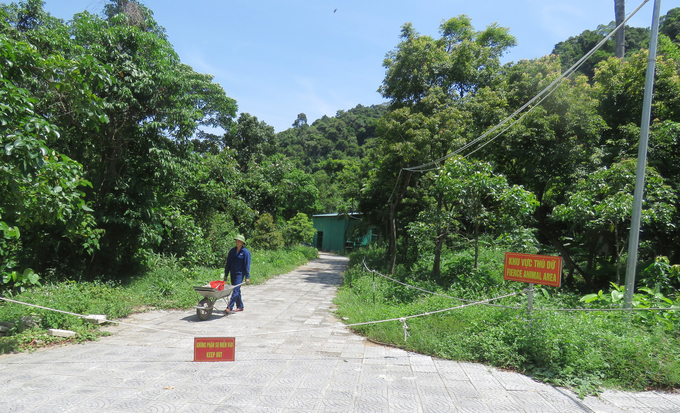
The semi-wild garden is where tigers are raised at Phong Nha - Ke Bang National Park. Photo: T.P.
The new Indochina tiger herd care and nurturing area has an area of nearly 3,500 m2, with full construction items to meet better care and nurturing conditions, helping individual tigers grow and develop well as well as such as ensuring the welfare of individual tigers. At the same time, improving the wildlife rescue and conservation capacity of the Phong Nha - Ke Bang National Park Rescue, Conservation and Creature Development Center.
The process of moving the rare Indochinese tiger herd takes place according to a very tight and strict process carried out by experienced international wildlife experts.
Mr. Nguyen Ngoc Anh, the Deputy Director of the Center said: “The health check process for tigers is quite complicated, from testing, taking samples, and weighing. Through health checks, the tigers developed well, proving that the rearing conditions were correct and responsive. Regarding the design of the cage, it meets international standards, with places to eat, sleep, play, and exercise for the tigers."
We came to a new foster area, located close to the road next to a large, green forest. “This is Do's new home. He now weighs nearly 150 kilograms. According to experts, he is a bit fat so he needs a lot of support for him to move," said Ms. Le in a gentle voice.
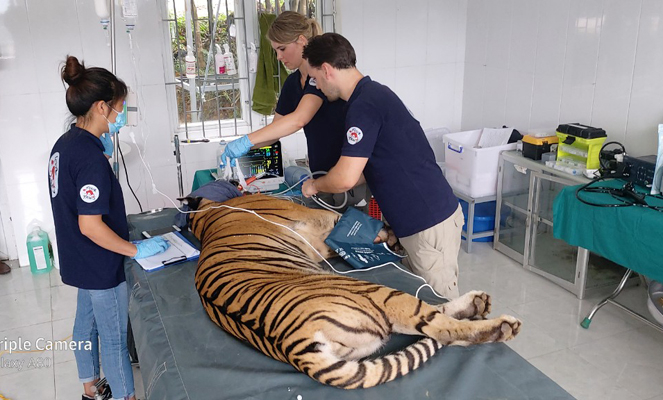
Foreign experts assist in health checks for tigers. Photo: H.Tri.
I walked up and raised my camera to take a picture of the tiger named Do. Before the camera could focus, the tiger, like a flash of bright lightning, flew close to the iron door. Without hesitation, he raised his front leg as if clinging to the iron door, causing me to suddenly step back. Two seconds is enough for the four eyes of a human and a tiger to look at each other. I felt a cold awl dragging like lightning from the top of my head to my spine.
Even though I knew there was still an iron door and a huge lock, the moment I suddenly faced the eyes of the king of the forest made me choke and my heart stopped beating. Unable to bear it, in the 5th second my whole body jerked aside like a bowstring and I looked up at the mountain, looking for the soft green color, not the yellow with black stripes...
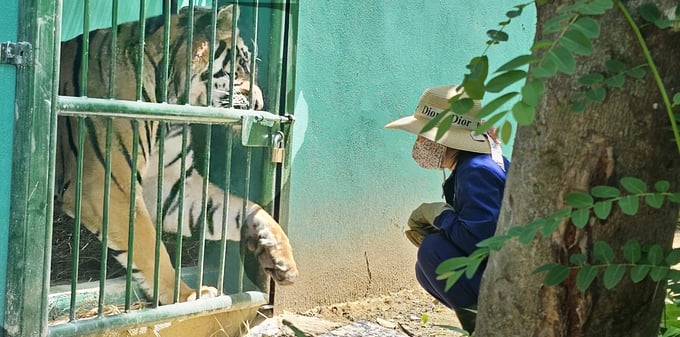
Ms. Nguyen Thi Le with the leader tiger named Do in the new "house". Photo: T.P.
Since the tigers were first brought home, rescue workers and veterinarians at the rescue center have been trained in care and safety procedures for people and pets. When asked, Mr. Cao Quy Ha, a rescue worker, who was assigned to raise the tigers from the beginning, said: "Tigers are considered the kings of the forest, the most ferocious, but we seeing them as our friends, placing love like our own children or siblings. Through the tiger's eyes and gestures, he can recognize our friendliness," Mr. Ha said.

Ms. Le called: "Baby, come here and play with me." Photo: T.P.
Mr. Ha led us to visit the new "housing" area of the 7 tigers. Seeing a stranger, the tiger at the head of the cage named Do stood up, looked for a moment, then stretched out and quickly ran to the door, one front leg reaching out. The tiger did not growl, but it kept clinging to the door with its front paws, then stepped back, circled around the cage, then suddenly rushed forward, raised its paws.
The movements seem to be mastered and repeated several times. Mr. Ha said, this house is where two male tigers are raised. This new tiger named Do is quite calm, it rarely shows an unpleasant attitude and is also often active, rarely lying still.
“If he sees a stranger, Do will walk back and forth and raise his front leg as if he's a bit threatening. If it was an acquaintance, he would lean his ear towards the door as if he wanted to have his ear scratched. Seeing that every time, we carefully scratched Do's ears. As he got used to it, he often acted like that," Mr. Ha added.
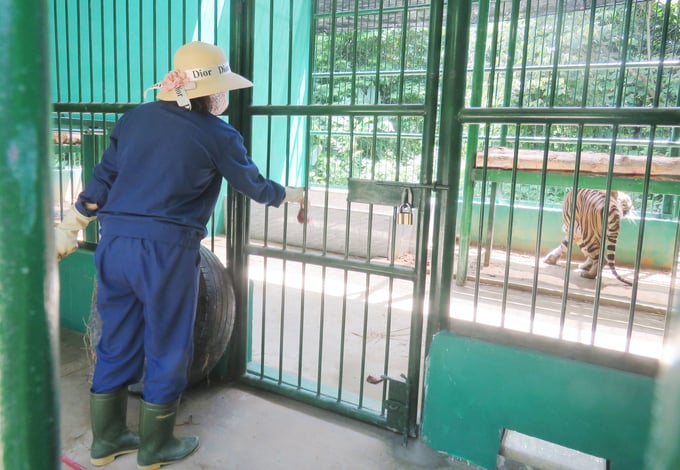
Other tigers are still wary of approaching familiar people because they detect strangers. Photo: T.P.
When it's time to eat, Ms. Le pushes a food cart containing beef, chicken, rabbit, pork ribs... These foods are guaranteed to be clean, divided by portions and changed from day to day. Taking a piece of beef and putting it inside the iron door, Ms. Le called out just enough to hear: "Baby, let's eat. Baby, let's go eat...". However, seeing that we were still looming outside, Do did not boldly come out right away but kept running back and forth with a hesitant and wary attitude.
Ms. Le warmed her voice again: "Baby, it's all family, come out and eat. Do, it's your family, come out and eat, I'll give it to you." About a minute later, Do came to the door. He didn't immediately eat the beef, but instead leaned over and rubbed his head against the door as if he wanted something. Ms. Le gently scratched his ear. Just like that, Do turned around, grabbed a piece of meat and went to the corner of the cage to squat and enjoy his delicious meal.
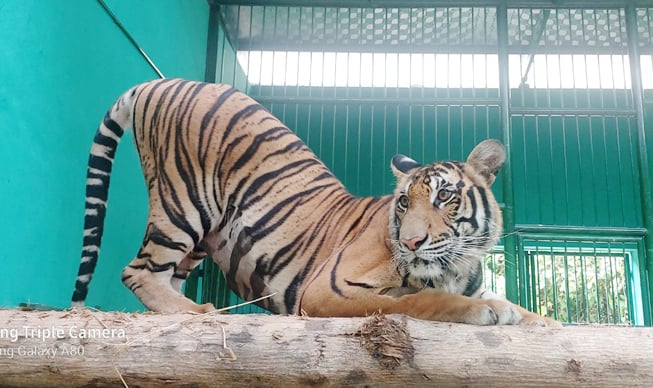
A tiger was moved to a new nursery. Photo: H.Tri.
When we got to the second tiger compartment, things were different. Catching a glimpse of us, this tiger cautiously backed away and ran to hide behind the substrate rather than coming out to eat. Ms. Le gently called out again: "Baby, baby..." ten times but he still didn't come out. She turned to us and told us: “This tiger has not yet caught up in the new home because it has just been moved, so it is upset. When it sees something unusual, it stops eating immediately. So please stay away for now and let him eat, otherwise he'll be hungry."
After moving the tigers to a new home, rescue workers were more often present outside the camp. They talk to the tiger like family members, everyone addresses the tiger as "baby" or "friend". Due to moving, the tiger is not familiar with the substrates here and his attitude is also erratic. Employees must recognize the eyes and expressions of each tiger that indicate their closeness to the employee. Mr. Ha said: "When we get close to the cage, we have to call out 'baby, honey' so that the tiger doesn't startle and panic. The tiger here remembers every voice and face of that caregiver."
Welcoming us on the road, Mr. Nguyen Ngoc Anh added that every day, the tiger care staff gently uses a stick to take out leftover food, weighs the quantity and takes careful notes, then sprays water to clean the cage, as well as the tray for drinking water and food.
“The conservation method of the center is to maintain, ensure enough nutrients and grow like in the wild, and not to let tigers get too fat. Feed the tigers twice a day, and change the food often," Anh said.
Talking to us, Mr. Pham Hong Thai, the Director of Phong Nha - Ke Bang National Park Management Board, said: "After nearly 2 years of nurturing, the tiger herd is in the maturity stage. Every year, we have to spend about VND 2 billion in food for the whole herd. Currently, Phong Nha - Ke Bang National Park is collaborating with a number of philanthropic businesses that love wildlife to support food for this herd of tigers."
It is known that in the coming time, Phong Nha - Ke Bang National Park will continue to carry out the process of raising tigers in a semi-wild fashion. "Whether or not these 7 tigers will be released back to the natural forest and reproduce, as well as whether the release of tigers into the forest will affect the safety of tourists. All these questions must be answered by scientific research to make a decision,” said Mr. Pham Hong Thai.
Translated by Bao Ngoc

(VAN) Extensive licensing requirements raise concerns about intellectual property theft.

(VAN) As of Friday, a salmonella outbreak linked to a California egg producer had sickened at least 79 people. Of the infected people, 21 hospitalizations were reported, U.S. health officials said.

(VAN) With the war ongoing, many Ukrainian farmers and rural farming families face limited access to their land due to mines and lack the financial resources to purchase needed agricultural inputs.

(VAN) Vikas Rambal has quietly built a $5 billion business empire in manufacturing, property and solar, and catapulted onto the Rich List.

(VAN) Available cropland now at less than five percent, according to latest geospatial assessment from FAO and UNOSAT.

(VAN) Alt Carbon has raised $12 million in a seed round as it plans to scale its carbon dioxide removal work in the South Asian nation.

(VAN) Attempts to bring down the price of the Japanese staple have had little effect amid a cost-of-living crisis.